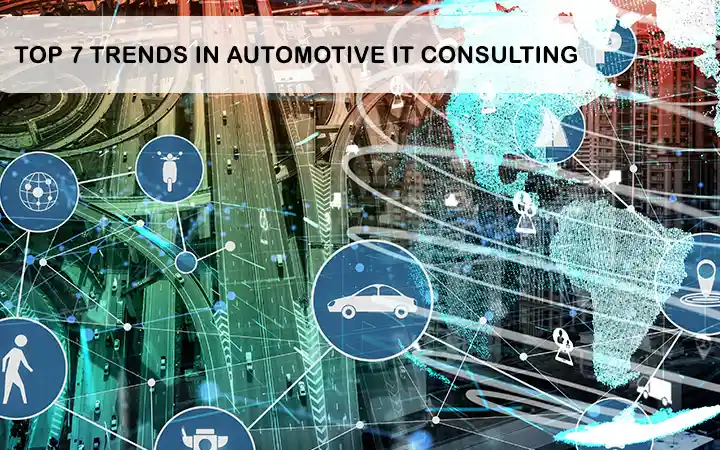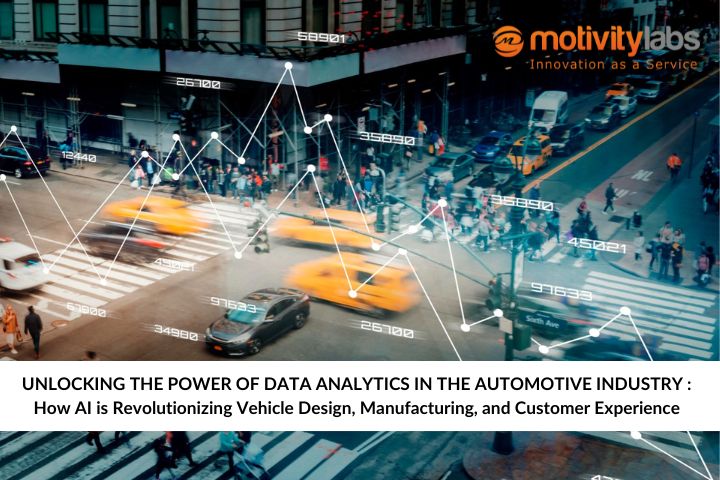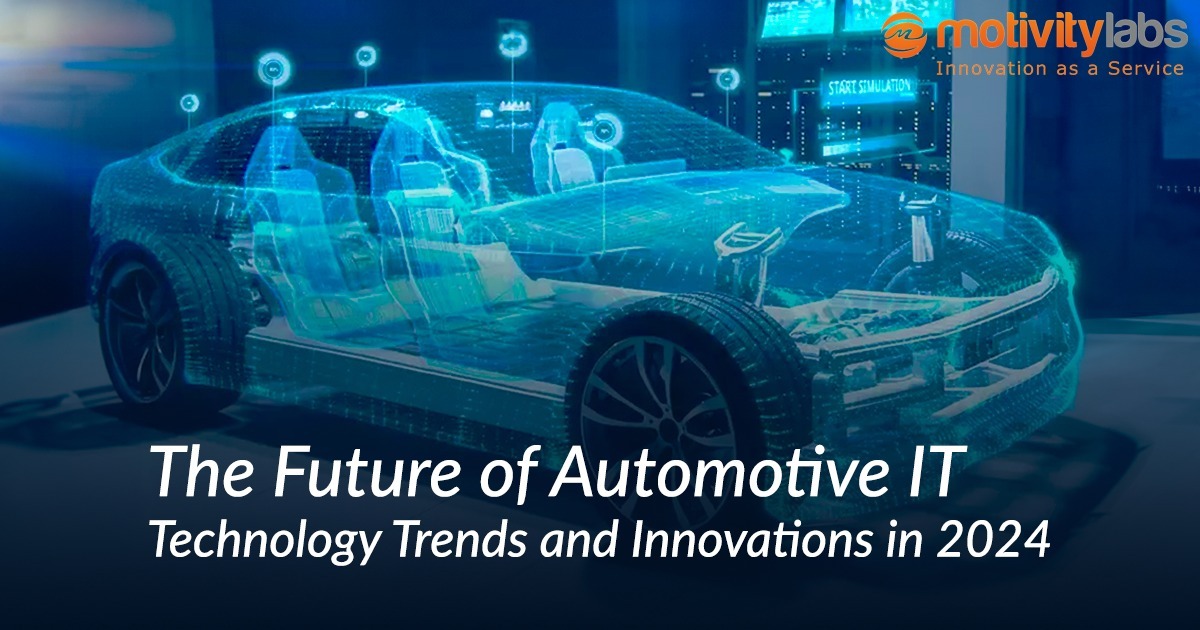Automotive IT trends can be considered the most disruptive trend among all the disruptive innovations today. They say the wheel is one of man’s greatest inventions and of the many things the wheel had impacted, transport comes at the forefront. Before the greatest invention, people used sleds to transport heavy goods. The combination of wheel and axle had worked wonders for our ancestors and thus born one of the biggest industries of humankind, the automotive industry! From early chariots and carts pulled by horses and bullocks to modern-day sophisticated automobile beasts, the automotive industry has transformed itself according to the changing technology from time to time offering various conveniences to the users in moving them or goods around easily and quickly.
But the modern-day user demands more than a box-with-wheels that merely transport him around. Auto manufacturers too, time and again have come up with various innovative automotive models to meet the expectations of the customers and are most successful in their pursuit. But things have changed drastically with various changes in technology and the time has come for the automobile industry to shift from hardware-run mechanical machines to software, or perhaps, artificial intelligence-controlled sophisticated modern machines. This has upped the competition in the automobile industry to adopt the technology at hand and be the first to offer its fruits to the customers. Since information technology is an alien subject for auto manufacturers in the sense that they mostly deal with mechanical machines, they need to hire automotive consulting services for incorporating the IT technology not just into the vehicles they make, but also in the process of making them. This whole process of associating IT with the automobile industry has led to some revolutionary disruptive IT trends in the automotive industry.
The following are the top 7 automotive industry technology trends that automobile makers are after.
1. Electric Vehicles or EVs:

Internal combustion engines are the most widely used in automobiles for power generation. The problem with IC engines is that they release pollutants into the atmosphere either directly or through secondary means when the emissions react with the elements in the atmosphere. The pollutants and greenhouse gases thus released can cause serious health issues in humans and other species as well, apart from causing severe damage to our ecosystem thru’ climate changes, ozone depletion, and triggering various other natural calamities.
Scientists have been looking for an alternative power source for automobiles all over the world as the present internal combustion engines have done much damage to the planet already and unless something very drastic is not done quickly, the human race is headed towards extinction for sure! Various technological innovations have led Scientists to generate cleaner and greener power from natural resources like sun, water, and wind. As for the automotive industry, electric vehicles or EVs are the best solutions to combat climate change and also to reduce greenhouse emissions.
The shift from traditional IC vehicles to EVs is perhaps at the top of all significant automotive IT trends that are happening right now, with both manufacturers and consumers keen to produce and use them respectively. At present, Europe is leading in making plug-in electric vehicles while China is being a close second. As several countries have set themselves to achieve net-zero emissions by 2050, the makers of automobiles from these economies too, are keen on developing EVs and committed to phasing out all combustion engine automobiles. Towards this end, the pace to produce EVs has been increased by all the auto manufacturers around the world, of course with the help of the latest technology.
2. Autonomous vehicles:
The next most relevant and important automotive IT trend for today’s times is an autonomous vehicle. An autonomous vehicle is one in which an automobile can drive itself to a destination by itself in autopilot mode using many inbuilt technologies and sensors such as active steering, anti-lock braking system, adaptive cruise control, GPS, radars, and lasers. To be able to build a self-driven, autonomous vehicle, an auto manufacturer should lend expertise from various technological fields outside his domain and integrate them with his own skills and make a model which was previously a “mechanical-driven” vehicle into a “software-driven” vehicle.

Let’s look at some of the advantages of autonomous automobiles. First and foremost is that accidents would be significantly reduced compared to a human driving an automobile. This is because, as opposed to the 180-degree vision of humans, an autonomous vehicle possesses a 360-degree vision and can see all around. The second significant advantage of an autonomous vehicle is it would be of great assistance to people with mobility issues and it requires no intervention from a human to drive around. The other advantages would be better traffic control and sustainability as these future vehicles would obviously run on cleaner fuels.
3. Connected vehicles:

The next trend in automotive consulting services is the making of connected vehicles. A connected vehicle is one that has the ability to connect and communicate with other systems outside the vehicle. In today’s world, everything is connected and why should automobiles be left behind? The connected car technology uses the internet to connect and communicate with other systems for various tasks. There are various types of connectivity technologies that are being used by the automobile manufacturers such as vehicle-to-infrastructure, V2I, vehicle-to-vehicle, V2V, vehicle-to-cloud, V2C, vehicle-to-pedestrian, V2P, vehicle-to-everything, V2X.
Apart from infotainment and entertainment services to the customers, the features of the connected vehicles are vast, right from alerting the customer about any critical information or malfunction within the vehicle to traffic alerts, real-time location sharing, tracking, emergency SOS calls, roadside assistance, remote vehicle diagnostics, downloading critical software updates from the maker, detecting pedestrians to avoid accidents, and the list goes on!
4. Digital Twins:
Big data is the current magic word for any industrial sector. A digital twin is a concept of manufacturing a product using large data available for that product which will help manufacturers to make products more efficient, faster, and with quality. This is one of the hottest trends right now in the automotive industry technology trends. A digital twin in the auto sector is a virtual replica of the original automobile which behaves exactly like in the real world with every process designed using the big data at hand and giving a real-time performance.

There are several benefits of using a digital twin in the automotive industry. Digital twin helps to test the performance of a vehicle before launching it into the market by virtually testing its quality. By unifying the data from several resources like data from earlier models and their performance, makers can examine, analyze and evaluate important insights in making the vehicles more efficient than before. Using digital twins, manufacturers can also train their employees anywhere in the world even before the actual installation of the physical equipment at the site. Using a digital twin method can avoid failures, improve maintenance, and speed up the manufacturing process. Global vehicle makers can quickly replicate the production line with a digital twin anywhere in the world. This helps them to start production of their vehicles anywhere in the world with agility and flexibility.
5. Online buying:

With everything available online automobiles too, are following suit. It is estimated an average vehicle buyer spends about 3 hours in an automobile dealer’s showroom. Now, he has the option of buying the vehicle at the click of the mouse relaxing at the convenience of his home. All the product details, features, and options are available for the customer to look into and even can virtually test-drive the vehicle he intends to buy.
The customer can complete all the paperwork online and can get the delivery of the vehicle at home! All this is possible when the automobile manufacturer has strong IT support from efficient automotive consulting services.
6. Cybersecurity :
With automobiles becoming more intelligent and smart, they are also prone to cyber attacks, just like any other system. Cybersecurity in the automotive industry refers to the protection of electronic systems, communication networks, software, data, and users from unauthorized access, damage, malicious attacks, and manipulation. Cybersecurity for automobiles is very important because the vulnerabilities can directly cause harm to the persons inside the vehicle.
A hacker can take total control of an automobile that is equipped with an advanced driver assistance system and can manipulate any or all the autonomous functionalities of the vehicle which can result in a crash causing harm to the lives. It is imperative on the part of the manufacturers to provide cybersecurity to all the vehicles they are making.

7. Vehicle-as-a-Service:

Vehicle as a service is an improvement to the current leasing model of vehicles. In the traditional model of leasing a vehicle, the vehicle is bound to the customer till the lease period ends. The new vehicle-as-a-service model offers flexibility to customers to upgrade their vehicles as per their requirements. Customers can subscribe to their favorite choice of vehicle for a short period of time and can upgrade the same at any point in time.
The advantage of vehicle-as-a-service is convenience, flexibility, and low subscription rates than buying a new vehicle. Top vehicle manufacturers are looking at offering the vehicle-as-a-service option to their customers and monitoring them using the cloud and associated technologies.
The above are the most happening IT trends in the automotive industry right now. If you take a closer look, all the automotive industry technology trends are based on artificial intelligence, big data, cloud, and 5G and automobile manufacturers make use of these emerging technologies to deliver efficient, intelligent, comfortable, and safe transport systems.



